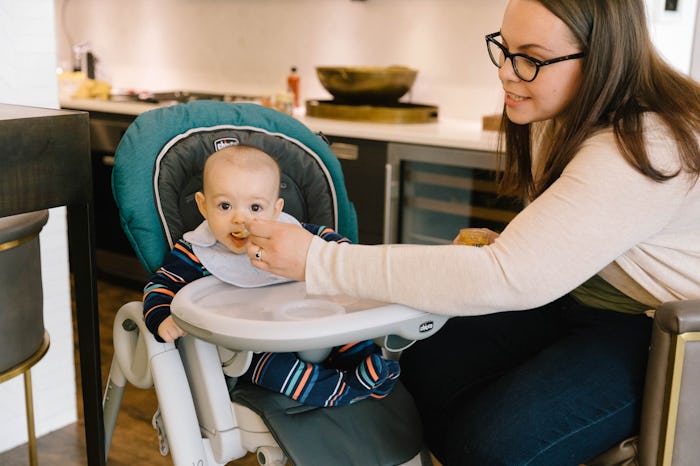Transitioning your baby to solid food is a big and exciting milestone, but it can also be stressful. From trying to gauge if your baby has eaten enough food, to nailing down exactly when and how to introduce solids into their diet, there's seemingly a lot of information for parents to learn with no clear resource for easily acquiring all of it.
Thankfully, the wonderful minds over at Happy Family Organics realized that there needs to be a better way to educate and support parents who have questions about feeding their baby, which is exactly why they created their Happy Mama Mentor live chat. The chat enlists the help of lactation specialists and registered dietitians to share real-time support and practical advice during every step of your feeding journey. Plus, they're all moms themselves, which makes them that much easier to talk to about any question that may pop up. Start a live chat with a Happy Mama Mentor here for infant feeding support!
To prove just how helpful Happy Family Organic's experts are, we asked them to share what they wish all new moms knew about transitioning to solids. Read their amazing advice below, and feel free to reach out to them for live advice from 8 a.m. to 8 p.m. Eastern Time Monday through Friday, and 8 a.m. to 4 p.m. Eastern Time on Saturdays and Sundays.
Wait Until They're 6 Months Old To Introduce Solids
"I see many new moms worrying about if their baby needs to start solids before the age of 6 months," says Happy Mama Mentor Jaime Windrow, M.S., R.D., C.S.S.D., L.D.N. The American Academy of Pediatrics recommends that babies wait until the age of 6 months to introduce solids, but Windrow explains that some parents feel inclined to try solids sooner. "They see their little one staring at mom and dad during mealtimes, and it looks like baby might just take the food right out of their hands! While being interested in food is a good trait to have, it is not the sole reason to start solids if they are younger than 6 months." Windrow recommends checking for these signs before starting solids:
- Baby is 6 months old
- Can sit up with support
- Baby weighs more than twice their birth weight
- Has good head control and can turn head away from the spoon (if using one)
- Can move their tongue forward when their lips are touched
Make "Under One, Just For Fun" Your New Golden Rule
Even though your baby is developing an all-new relationship with solid foods, breastmilk or formula should remain as their primary source of nutrition for the first year, making your goal for solids to simply help your baby develop a positive relationship with food. "In the first few months, the goal of feeding baby is to introduce them to a wide variety of flavors and textures to help open baby’s palate for years to come," explains Happy Mama Mentor Rachel Gargano, Registered Dietitian and Certified Breastfeeding Specialist.
Start With Simple, Nutritious Solids
"Keep in mind that [your baby's] palate is a clean slate to learn and appreciate the pure taste of foods without needing additional flavorings like salt or sugar," says Happy Mama Mentor Andie Schwartz, M.Ed., RD, CLC.
Schwartz encourages new moms to give their baby as healthy a start as possible when deciding which solids to feed them. "Introduce your little one to veggies first. This will introduce their palate early to the unique taste of nutrient rich vegetables, which has been shown to improve their taste development for many other new foods in the future."
Trust That Your Baby Knows When They're Full
"As moms, sometimes we worry that our little ones aren’t eating enough, but babies are good at knowing their hunger and fullness cues," says Gargano. Knowing that your baby's eating habits can seemingly change day to day, Gargano reminds moms to avoid forcing food on your baby, which could cause negative associations with eating solids. "Try to just go with the flow. Offer one food, or a small variety of foods at each meal and let baby decide when they've had enough. This important skill of self-regulation is one to foster for years to come!"
Remember: Patience Is Key!
"It can take up to 20 times for a baby to decide to accept a food, so if they make a face and it appears that they don't like it, don't give up on offering that food," says Allison Tannenbaum, R.D. and Happy Mama Mentor, who recommends trying the same food in a different cooking style for your next try.
It's OK To Let Your Baby Make A Mess
Fun fact: You'll want to resist wiping your baby's face clean after every couple of bites, since smelling their food actually helps them in the long run. "Babies learn to eat with most of their senses. They first look at food, touch it, smell it, and then hopefully taste it," explains Windrow. Especially during baby's first year, Windrow encourages you to make eating new, colorful solids a fun experience for your baby.
Don't Stress Yourself Out
Remember that this is a fun milestone for you and your baby, so feel free to treat it as such. "Setting up a relaxed feeding environment and approach now for you and your baby will benefit you for years to come," recommends Janel Funk, R.D. and Happy Mama Mentor. Plus, Funk likes to remind parents that a big part of teaching your baby about solids is simply to be a positive role model for them. "Even if your baby is just starting out on purees, she can learn so much by watching you eat! Try to enjoy meals together so you can role model healthy eating habits."
This post is sponsored by Happy Family Organics.
